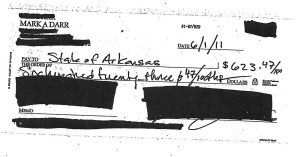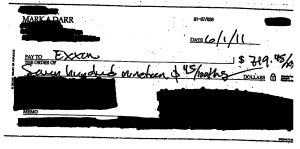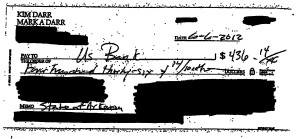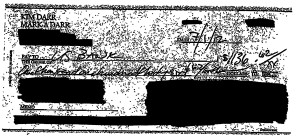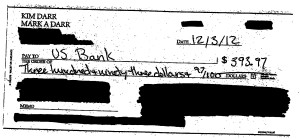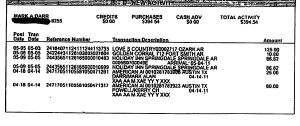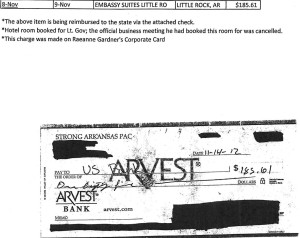Let’s assume, for the sake of argument, that Lt. Gov./AR04 candidate Mark Darr’s explanation for his seemingly profligate spending of campaign funds on personal expenses and personal purchases is, as Brummett suggests, “sloppiness” in record keeping and CC&E reporting. Let’s all agree, for a few minutes, not to laugh at the idea that none of this was intentional.[1]
Starting from that assumption, my question is this: Why is that a valid excuse?
What I mean is, are you really comfortable excusing poor record keeping and shoddy reporting practices, when the only way we as voters can keep tabs on such things is if the records are done correctly? The reason CC&E reports are public records is so people can actually review a candidate’s contributions and expenditures and hold them accountable for both. Knowing that, I find “sloppy” as an excuse to be incredibly offensive; the law requires a candidate to keep detailed records, but doesn’t ask for that much detail. If a candidate can use laziness or carelessness to obviate non-compliance with those requirements, then what good are the requirements? Wouldn’t every candidate — or at least every candidate who wanted to improperly use money — be better off just being lazy and sloppy with their reporting in that case?
Anyway, I digress. Whether you chalk up what we’ve seen so far to sloppy reporting or willful violations, let’s move on to Part 2 of our analysis of Mark Darr’s fiscal issues. Maybe that will change some minds in the “sloppy” camp.
As lieutenant governor, Darr has access to credit cards for gas stations (Mobil and Exxon, just like most constitutional offices) as well as a credit card that can be used for business purchases. Let’s start with the fuel.
From when he took office in January 2011, until early May 2011, Darr racked up $1,342.92 on the office gas cards. That would be fine, except that, at some point prior to June 1, 2011, Darr apparently realized that spending that much money running back and forth to Northwest Arkansas (see the repeated stops in Russellville) was not actually an office expense, so he repaid that amount in two checks on 6/1/11 from his and his wife’s personal account (not his campaign account).[2]
Coincidentally, I’m sure, Darr’s CC&E’s for this time period do not contain any expenditures at gas stations. Yet, just as coincidentally (I’m sure), beginning just after Darr stopped using the State’s credit card for fuel purchases, we see “fundraisers” at gas stations begin popping up. Shockingly, these fundraisers all appear to be on the same LR-to-NWA route, and even at the same Pilot station in Russellville in one case, and in amounts that are almost identical to the previous fuel purchases on the state credit card. If it strikes you as odd that fuel purchases on the state credit card were considered personal use and reimbursed by Darr, while similar fuel purchases from his campaign account were ridiculously classified as “fundraisers” and NOT reimbursed, it should.
Darr continued purchasing fuel from his campaign account, under the guise of “fundraisers” and “supplies” for about ten months. Then, in April and early May of 2012, according to Darr’s spokesperson, he used his state credit card “out of error” to purchase fuel totaling $436.14, which he reimbursed from his personal account on 6/6/12.[3]
But here’s something I don’t get: if that use of the card was “out of error,” and a check written on June 6 was designed to correct that error, then why did he continue using that same state credit card to purchase fuel after June 6, 2012? And when did he figure out that he’d been erroneously using that card? Because running up $1,136.62 in personal gas expenses on that card in June 2012 alone suggests that either the activity wasn’t accidental or he’s just a really, really slow learner.
Despite the checks on June 6 and July 1, Darr continued to use the credit card for personal gas expenses until August 9, 2012, totaling another $393.97. However, even though he knew that such expenses had to be reimbursed to the state, he didn’t actually make that reimbursement until December 3, 2012.
Now, if you’ll recall, this same stretch of time, from April through September of 2012, was when Darr was having a bit of trouble financially, culminating in the near-foreclosure of his home. He was also bought out of his interest in MAD Pizza by his father in law around this time. Whatever the reason for these financial woes, maybe the reimbursement to the State had to wait a few months on this round of gas expenses simply because Darr was too broke to pay it.
If it was simply the use of his state cards for fuel expenses, which have since been reimbursed, I wouldn’t be writing this post. So let’s move on to non-fuel purchases.
In Darr’s April 12, 2011 CC&E, there’s an expenditure for $422.80 for an airplane ticket from American Airlines on February 22, 2011. Oddly enough, there’s also an expenditure on his state-issued credit card on February 22, 2011, in the amount of $422.80 for an airline ticket from American Airlines.
That’s . . . interesting.
There are also what appear to be two two-night stays at the Westin City Center in Washington D.C., to the tune of about $425-450 per night, on March 25 & 26, 2011, and March 23 & 24, 2012. While that’s not illegal, it does seem a little odd that he would splurge on an expensive hotel in D.C. when traveling on the State’s dime; after all, this is a guy who stayed at the same La Quinta in Bryant multiple times (5/17/10, 7/27/10, 9/24/10, 10/19/10), a La Quinta in Conway (4/26/10), and a Hampton Inn in Bryant (10/4/10) when traveling on his own dime, and none of those rooms cost even $200/night. [Tangent: Why Bryant?]
Speaking of that D.C. trip? The plane tickets for the 2011 version were not purchased with a state credit card or campaign money, but the baggage and other fees for the trip were charged to the State on behalf of Mark and Kim Darr. I’m sure every taxpayer is happy to have chipped in and helped them cover baggage costs on their little getaway. (Another oddity about both trips to D.C.: in both cases, there is a corresponding stay at a Holiday Inn Express in Evansville, IN, on the same date.)
Along the same lines, at least in terms of things that are hard to make sense of, is this:
That would be two rooms at a Holiday Inn in Springdale, less than 10 miles from Darr’s house. (There’s also a fuel purchase at Love’s in Ozark, which was apparently not reimbursed to the State and was not a fundraiser this time around.)
Also on that statement, you see Darr and staffer Kerry Powell charging the cost of certain fees with American Airlines to the State, despite the fact that they were on a trip (worth $1,420.00) paid for by something called the Goodman Network.
Moving on . . .
In July of 2011, Darr returned to Austin, TX, to meet with Rick Perry and discuss whatever it is that Rick Perry discusses. (My guess: race relations.) If he flew, the purchaser of the plane ticket is unclear, as it doesn’t show up on a CC&E, a state credit-card receipt, or an SFI as a gift. What does show up is that the State paid for his hotel:
While his campaign — again, post-election, where campaign funds for personal expenses aren’t even allowed as a loan — paid for a fancy dinner at NFL bust Vince Young’s steakhouse and “supplies” at Prime Mart:
There are other issues with Darr’s use of the state credit card, but, comparatively, most are minor or would seem like nitpicking at this point in the post. Rather than continue to go through them line by line, here’s a link to all of the credit card invoices that I received back in June. If you take the time to look and notice anything else, feel free to mention it in the comments.
I do see one last thing, however, that warrants mention. In November of last year, staffer Raeanne Gardner booked a room for Darr at the Embassy Suites here in Little Rock. According to the reimbursement documentation, the “official business meeting” that Darr had booked the room for was canceled, and, “per Chief of Staff Bruce Campbell,[4]” the state was being reimbursed by Darr. Except, check this out:
That’s not a personal check from Mark Darr; that’s a check from Mark Darr’s PAC, “Strong Arkansas,” reimbursing the state. But we just learned, from Bruce Campbell, that the room was reserved for “official business.” So (a) why would there be a need to reimburse the state if this was an official lieutenant governor-related business, and (b) if Mark Darr was personally liable for the reimbursement, why would his PAC make the payment? After all, his CC&E reports don’t show a donation to him for $185.61 from Strong Arkansas PAC.
***
A final aside here, and feel free to skip it if legal analysis bores you: I’ve heard suggestions from people that Darr’s use of campaign funds for personal expenses is ok because he had loaned his campaign money, and these expenditures were simply a way of writing down the debt owed to him by the campaign. Problem is, the law only allows a person to take campaign money for personal expenses as a loan to be repaid to the campaign (or, theoretically, to offset a loan to the campaign) prior to the election. Because these expenditures were post-election, he was absolutely prohibited from taking funds for personal use, regardless of his possible intent for doing so.
***
[1] I don’t buy it for a second. You don’t somehow manage to order four Arkansas season tickets in April of 2011 and call to make a payment on those same tickets in late August, then specifically record that expenditure as a “fundraiser,” by being sloppy. You do it by assuming no one will check your alleged expenditures, which is the opposite of sloppy in this context.
[2] You might recall someone making a big deal out of improper use of state gas cards to travel back and forth to NWA around that time. The fact that Darr did not use his state gas card for personal fuel expenses after the date of that post is . . . interesting, no?
[3] That’s right: when he did go back to using state cards for fuel, he specifically avoided the state gas card. Combined with what you just learned in footnote 2, I’d say this cuts strongly against any argument that his problem was sloppiness. He seems fully aware of what he’s doing throughout this stuff.
[4] No relation.
